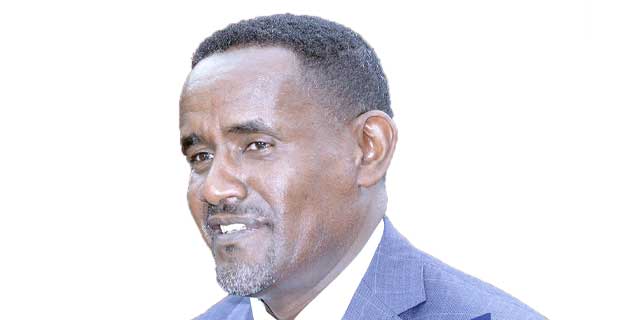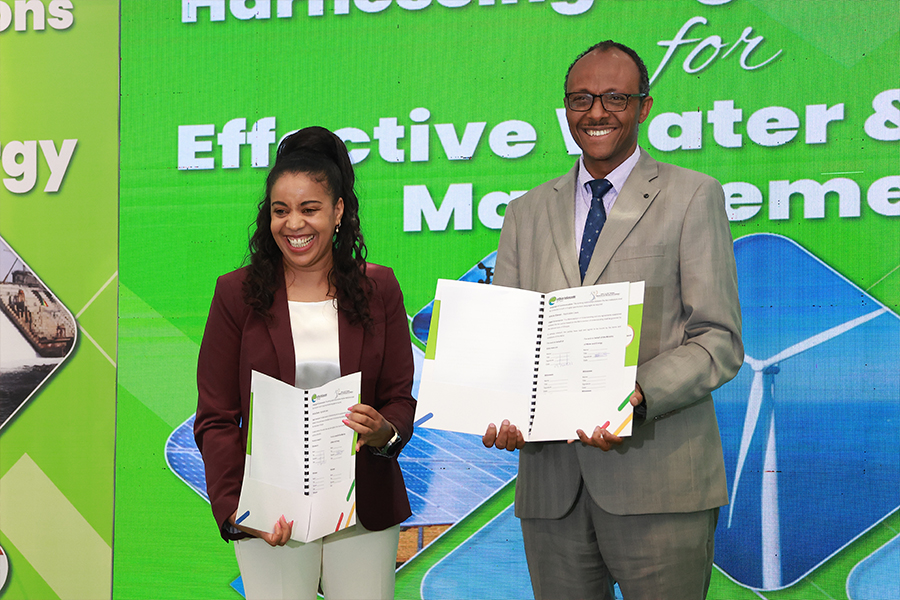
Radar | Nov 20,2021
Feb 8 , 2020
By GELILA SAMUEL ( FORTUNE STAFF WRITER
)
 Oumer Hussein, minister of Agriculture.
Oumer Hussein, minister of Agriculture. The directive that exempts imported agricultural machinery and inputs from duties reached the final level.
Drafted by the Ministry of Agriculture, the directive has been in the making for the last eight months to waive taxes and duties on selected agricultural machinery, irrigation technologies and animal feed processing machinery, as well as agricultural inputs.
The 96-page draft directive is now tabled to the senior officals of the Ministry and waiting for final approval. It will waive duties on a total of 591 types of agricultural machinery, accessories and agricultural inputs including tractors, combiners, generators, pumps, fertiliser and seeds.
The Ministry started the drafting process after the Agricultural Transformation Council proposed the duty exemption on selected agricultural machinery and technologies in December 2017. The Council called for the exemption hoping to enhance agricultural productivity and ensure food security through agricultural mechanisation.
Agriculture contributes to close to 46pc of GDP and employs over 80pc of the population.
The Ministry of Agriculture identified and listed the machinery and inputs sent to them from the Ministry of Finance, for approval. The Ministry sent the letter to the Customs Commission last May to be effective as of the same month.
However, the directive could not be enacted, since the implementation requires a legal framework and tractors were excluded from the list, according to Tamiru Habte, director of mechanisation at the Ministry of Agriculture.
Mulay Weldu, tax policy director at the Ministry of Finance, says that tractors were excluded from the original list with the main aim of not discouraging domestic tractor assemblers.
"But we included tractors in the list after learning that the local production doesn't satisfy the demand," Mulay said.
After getting the green light from the Ministry of Finance to include tractors in the list, the Ministry of Agriculture drafted the directive and sent it back to the Finance Ministry two months ago for comment.
The draft directive limits the number and types of machinery that will be imported tax-free by private agricultural training centres, youth and women's organisations, non-governmental organizations (NGOs), rental service providers, universities, technical and vocational education & training schools (TVETs) and garages that are engaged in maintaining agricultural machinery.
However, it posed no limit on agricultural machinery importers, manufacturers, assemblers, agricultural institutes, government enterprises, public enterprises, cooperative unions, associations and federations.
To import the machinery and the inputs, the importers should get a certificate of competence, which must be renewed every two years, from the Ministry of Agriculture. The Ministry is also supposed to report - every six months - to the ministries of Finance and Revenues and the Customs Commission on the performance of the scheme.
The Ministry also prepared a logo or a plate number for differentiating the machinery imported through this programme by working with the concerned stakeholders, according to the draft directive.
Machinery and equipment that are imported through this scheme cannot be transferred to a third party as gifts, through inheritance or sales. But if transferred, all the necessary taxes must be paid.
The beneficiaries are also supposed to file reports to the Ministry of Agriculture every three months. The report should include the number of equipment they sold along with the prices, the type of rental agreements, the name and address of the buyers and the renters. The directive has also waived the Value-Added Tax (VAT) for renting these agricultural machines.
In addition, 13 agricultural operation services are exempted from any VAT, following the approval on November 1, 2019.
Between 2011 and 2016 a total of 12 billion Br worth of agricultural mechanised equipment was imported, and 3.3 billion Br in taxes and duties were paid on its behalf.
The Ministry of Finance also lowered its target of duties and tax revenues from the import of machinery this fiscal year. It plans to collect 3.2 billion Br in revenue from machinery imports, 308 million Br lower than the preceding year.
Tadesse Lencho (PhD), an assistant professor at Addis Abeba University's School of Law & Governance, doubts if this is beneficial for farmers.
“Importers would only be compelled to increase the prices even though the tax pressure is lifted from them,” said Tadesse. “It’s naive if the government thinks this will lessen the pressure on the farmers.”
Tadesse says that the government should propose a finance leasing scheme for these kinds of capital goods, as they are a means of production.
PUBLISHED ON
Feb 08,2020 [ VOL
20 , NO
1032]

Radar | Feb 02,2019

Fortune News | Aug 17,2025

Fortune News | Jun 08,2024

Radar | Jan 03,2021

Radar | Nov 11,2023

Dec 22 , 2024 . By TIZITA SHEWAFERAW
Charged with transforming colossal state-owned enterprises into modern and competitiv...

Aug 18 , 2024 . By AKSAH ITALO
Although predictable Yonas Zerihun's job in the ride-hailing service is not immune to...

Jul 28 , 2024 . By TIZITA SHEWAFERAW
Unhabitual, perhaps too many, Samuel Gebreyohannes, 38, used to occasionally enjoy a couple of beers at breakfast. However, he recently swit...

Jul 13 , 2024 . By AKSAH ITALO
Investors who rely on tractors, trucks, and field vehicles for commuting, transporting commodities, and f...

Oct 18 , 2025
The political establishment, notably the ruling party and its top brass, has become p...

Oct 11 , 2025
Ladislas Farago, a roving Associated Press (AP) correspondent, arrived in Ethiopia in...

Oct 4 , 2025
Eyob Tekalegn (PhD) had been in the Governor's chair for only weeks when, on Septembe...

Sep 27 , 2025
Four years into an experiment with “shock therapy” in education, the national moo...